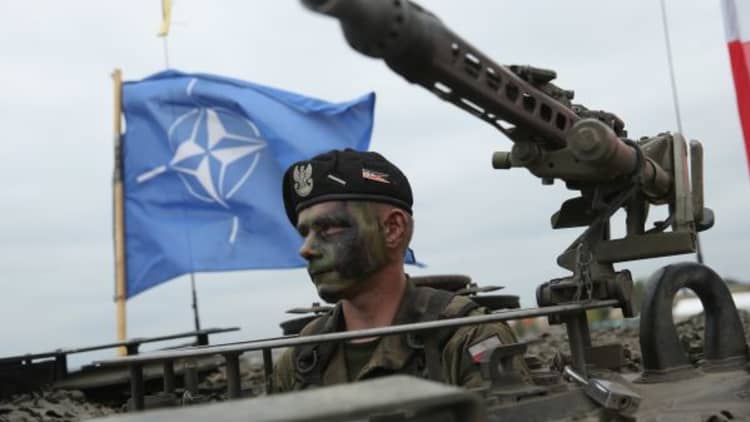WASHINGTON — NATO, the world's most powerful military alliance, is stuck in the middle of tricky weapons sale between Russia and Turkey and the United States.
Last year, Ankara signed an agreement with Moscow for S-400 missiles, a deal reportedly worth $2.5 billion. All the while, Turkey has helped finance America's most expensive weapons system, the F-35 Joint Strike Fighter.
In short, these two big ticket weapons systems that Turkey hopes to add to its budding arsenal can be used against each other.
The Russian-made S-400 missile system, which is equipped with eight launchers and 32 missiles, is capable of targeting stealth warplanes like the F-35 fighter. Turkey's march toward procuring the Russian missile system has raised concerns among NATO partners and Washington, who are wary of Moscow's increasing military presence in the region.
The S-400 system is believed to have a larger range than the American-made THAAD missile system and is estimated to cost significantly less. Turkey is slated to receive the S-400 next year and is expected to have the system ready for use by 2020.
Meanwhile, Congress has pushed back on the scheduled transfer of two F-35 jets to Turkey.
"I hope that it's possible to find a solution," NATO Secretary General Jens Stoltenberg said Friday at the Heritage Foundation when asked about the weapons deals. "I welcome the dialogue but at the same time it is important to recognize the importance Turkey is playing to the whole alliance," he added noting that an ultimatum from Washington would be unhelpful.
"Turkey is a very important ally for NATO for many reasons, but not least because of its geographic location," Stoltenberg began. "If you look at the map you see how big Turkey is, but also how Turkey is bordering Iraq, Syria, and you will understand why Turkey has been so important in the fight against ISIS Daesh. Infrastructure bases, air bases have been extremely important in the success we have had in degrading and fighting ISIS," he added.
Read more: Turkey begins constructing site for Russian missile system — despite US warnings
Turkey, an F-35 program partner, is currently slated to receive two of the jets. That delivery of Lockheed Martin's fifth-generation jets is the start of what Ankara hopes will eventually amount to an arsenal of 100 of the stealth aircraft.
In June, the U.S. defense giant held a formal hand-off ceremony at its F-35 facility in Fort Worth, Texas. After the ceremony, Lockheed ferried the aircraft to Luke Air Force Base in Arizona where Turkish pilots began training alongside U.S. airmen.
In the colossal $717 billion National Defense Authorization Act, Congress tasked the Pentagon to deliver a report in 90 days outlining the potential risks associated with Turkey's purchase of the S-400 missile system.
"We are going through this current issue between us, and we are engaged in, I would call it, frequent, right now, very frequent, discussions at very high levels to try to sort this out," Defense Secretary James Mattis told reporters traveling with him earlier this month.
"I believe that there is sincerity on both sides to try to work this out. So we're engaged in it right now, and I — you know, I need to work with them directly on this, as does Secretary [of State Mike] Pompeo and others on our side," he added.
What's more, tensions between the U.S. and Ankara have intensified over the detention of American pastor Andrew Brunson.
Read more: White House: US sanctions top Turkish officials over detention of American pastor
In October 2016, Turkey detained Brunson on accusations of spying and attempting to overthrow the government. Brunson has denied all charges.
Watch: What is NATO?



